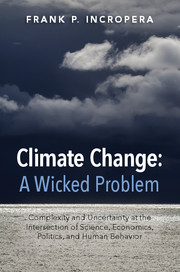 Climate Change: A Wicked Problem
Climate Change: A Wicked Problem Book contents
- Frontmatter
- Dedication
- Contents
- Foreword by Anthony F. Earley Jr.
- Foreword by G.P. “Bud” Peterson
- Foreword by Arun Majumdar
- Preface
- Acknowledgments
- Abbreviations
- 1 Energy, economics, and climate change
- 2 The Earth's climate system
- 3 Greenhouse gases
- 4 Global warming
- 5 Consequences of global warming
- 6 Mitigation, adaptation, and geoengineering
- 7 Public policy options
- 8 The politics of global warming: a history lesson and future prospects
- 9 Dissenting opinions: the great hoax
- 10 The ethics of climate change
- 11 A way forward
- Appendix A Units and conversion factors
- Appendix B Fossil fuels
- Appendix C Anthropogenic sources of natural gas and methane
- Appendix D Environmental time scales and inertia
- Appendix E Coal-fired power plants: operating conditions and costs of carbon capture and sequestration
- Notes
- References
- Index
- Plate section
Foreword by Arun Majumdar
Published online by Cambridge University Press: 05 October 2015
- Frontmatter
- Dedication
- Contents
- Foreword by Anthony F. Earley Jr.
- Foreword by G.P. “Bud” Peterson
- Foreword by Arun Majumdar
- Preface
- Acknowledgments
- Abbreviations
- 1 Energy, economics, and climate change
- 2 The Earth's climate system
- 3 Greenhouse gases
- 4 Global warming
- 5 Consequences of global warming
- 6 Mitigation, adaptation, and geoengineering
- 7 Public policy options
- 8 The politics of global warming: a history lesson and future prospects
- 9 Dissenting opinions: the great hoax
- 10 The ethics of climate change
- 11 A way forward
- Appendix A Units and conversion factors
- Appendix B Fossil fuels
- Appendix C Anthropogenic sources of natural gas and methane
- Appendix D Environmental time scales and inertia
- Appendix E Coal-fired power plants: operating conditions and costs of carbon capture and sequestration
- Notes
- References
- Index
- Plate section
Summary
There is something innately human about caring for other humans and caring for our planet as a whole. Yet, on an issue such as climate change, which arguably could affect all humans and the planet, we are surrounded by controversies, conflicts, and debates in our social discourse. Why? It is because among the many issues that we all face today, climate change spans perhaps the most number of dimensions: scientific, economic, social, ethical, religious, and political. Confronted with this magnitude of complexity, we often grasp only a few facets that we can individually fathom and ignore the other dimensions, epitomizing the story of the blind men and an elephant. It is, therefore, not surprising to find people from different (and even similar) backgrounds talking past each other. Clarity is elusive. In such moments of confusion we need someone to simplify, distill, and connect the dots for us. This remarkable book by Frank Incropera does exactly that – it offers the most balanced, unbiased, and holistic view of this highly complex landscape.
The book starts with energy, which is the lifeblood of our modern life and our economy. When we flip a light switch, drive to our neighborhood grocery store, or do a Google search, we unwittingly receive the benefits of 250 years of industrial revolution that started with the steam engine running on coal to modern computers powered increasingly by natural gas. And this industrial revolution has been largely about how we sourced, distributed, and used energy. It was and continues to be predominantly based on fossil energy. Burning fossil fuels emits carbon dioxide in the atmosphere, which has been claimed to be the key culprit behind global warming.
Dr. Incropera explains with utmost clarity what we know, what is the uncertainty in our knowledge, and what we don't know from the scientific viewpoint. How does our climate work? How much carbon dioxide have we emitted so far? How long does it last in the atmosphere? Are there other sources of carbon dioxide? Are there other greenhouse gases and what influence do they have compared to carbon dioxide? What are the feedback mechanisms and what are the tipping points? How close are we to them?
- Type
- Chapter
- Information
- Climate Change: A Wicked ProblemComplexity and Uncertainty at the Intersection of Science, Economics, Politics, and Human Behavior, pp. xvii - xxPublisher: Cambridge University PressPrint publication year: 2015
